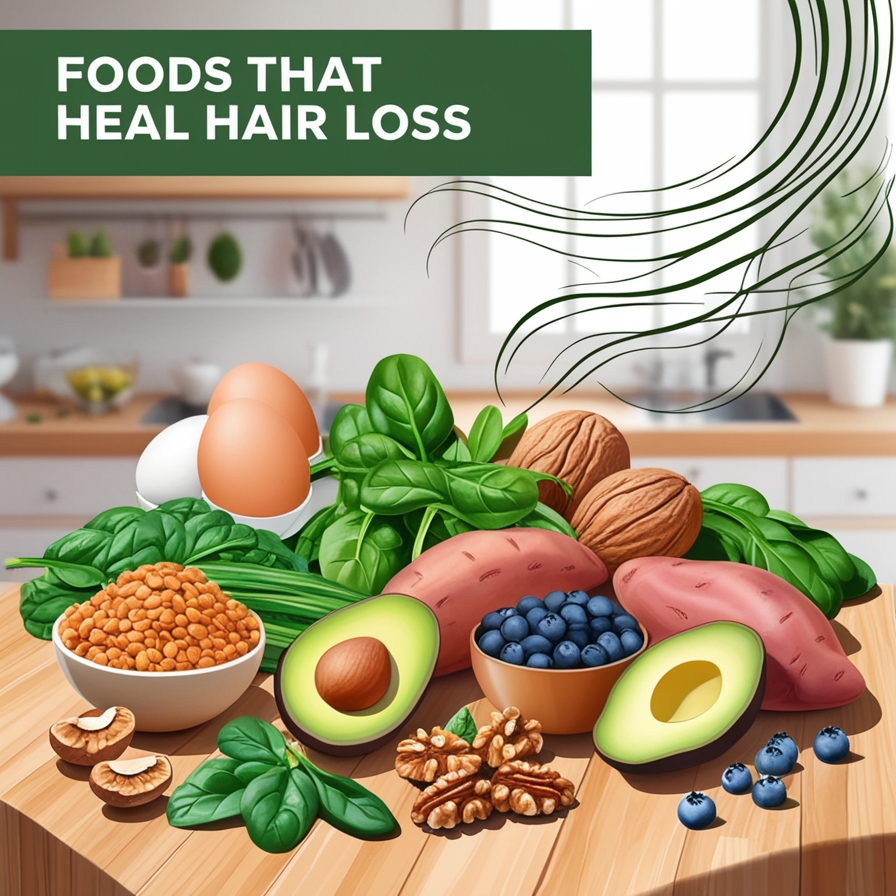Hair loss can be a distressing experience, often linked to factors like genetics, hormonal changes, stress, or nutritional deficiencies, while medical treatments and lifestyle changes can help manage hair loss, a nutrient rich diet plays a crucial role in promoting healthy hair growth and preventing further damage, here is a detailed look at foods that can support hair health and help you combat hair loss naturally.
1. Eggs
-
Key Nutrients: Biotin, Protein, Vitamin D
-
How They Help. Eggs are rich in biotin, a B-vitamin essential for the production of keratin, a structural protein in hair, A deficiency in biotin can lead to brittle hair and hair loss, eggs also provide high quality protein, which strengthens hair strands and prevents breakage.
-
How to Include. Enjoy eggs boiled, scrambled, or as part of your favorite dishes, incorporating 4-7 eggs per week can significantly benefit your hair health.
2. Spinach
-
Key Nutrients. Iron, Folate, Vitamin A, Vitamin C
-
How It Helps. Iron deficiency is a common cause of hair loss, especially in women, spinach is packed with iron, which aids in oxygen transport to hair follicles, Vitamins A and C in spinach promote the production of sebum, a natural oil that moisturizes the scalp and keeps hair healthy.
-
How to Include. Add spinach to smoothies, salads, or sauté it as a side dish, aim for at least 1 cup of spinach daily for optimal results.
3. Fatty Fish (Salmon, Mackerel, Sardines)
-
Key Nutrients. Omega-3 Fatty Acids, Vitamin D, Protein
-
How It Helps. Omega-3 fatty acids nourish the hair shaft, improve scalp health, and reduce inflammation that could hinder hair growth, Vitamin D supports the creation of new hair follicles, boosting hair density.
-
How to Include. Enjoy fatty fish grilled, baked, or in salads at least twice a week for sustained benefits.
4. Nuts and Seeds
-
Key Nutrients. Vitamin E, Zinc, Selenium, Omega-3 Fatty Acids
-
How They Help. Vitamin E in nuts and seeds acts as a powerful antioxidant, improving scalp circulation and repairing hair damage, Zinc and selenium help maintain the integrity of hair follicles and reduce excessive shedding.
-
How to Include. Snack on almonds, walnuts, flaxseeds, or chia seeds, sprinkle them over your breakfast cereal or yogurt for added crunch and nutrition.
5. Sweet Potatoes
-
Key Nutrients. Beta-carotene (converts to Vitamin A)
-
How They Help. Beta carotene promotes the production of sebum, a natural scalp conditioner, It also stimulates cell regeneration, which supports healthy hair growth.
-
How to Include, Roast sweet potatoes as a side dish, or blend them into soups, consuming 1 medium sweet potato every few days can enhance hair texture and shine.
6. Avocados
-
Key Nutrients. Healthy Fats, Vitamin E, Vitamin C
-
How They Help. Avocados are rich in monounsaturated fats that hydrate the scalp and strengthen hair, Vitamin E improves blood flow to hair follicles, while Vitamin C supports collagen production, a key component of strong hair.
-
How to Include. Add avocado slices to salads, blend into smoothies, or use as a spread on whole grain toast.
7. Beans and Lentils
-
Key Nutrients. Protein, Iron, Zinc, Biotin
-
How They Help. Beans and lentils are plant based sources of protein and iron, crucial for hair strength and growth, they also contain zinc and biotin, which support hair follicle health and prevent hair thinning.
-
How to Include. Add lentils to soups, stews, or curries, snack on roasted chickpeas or include black beans in your meals regularly.
8. Berries
-
Key Nutrients. Vitamin C, Antioxidants
-
How They Help. Vitamin C boosts collagen production and strengthens the hair structure, antioxidants in berries protect hair follicles from damage caused by free radicals.
-
How to Include. Incorporate blueberries, strawberries, or raspberries into your morning oatmeal or as a snack.
Additional Tips for Hair Health
-
Stay Hydrated. Drinking enough water helps maintain scalp moisture and overall hair health.
-
Avoid Processed Foods. Limit sugary and processed foods, as they can cause inflammation and negatively impact hair growth.
-
Manage Stress. Practice relaxation techniques such as yoga or meditation to minimize stress related hair loss.
By incorporating these nutrient dense foods into your diet and maintaining a healthy lifestyle, you can promote strong, vibrant hair and reduce the risk of hair loss, consistency is key, so make these foods a regular part of your meals for long term benefits.

